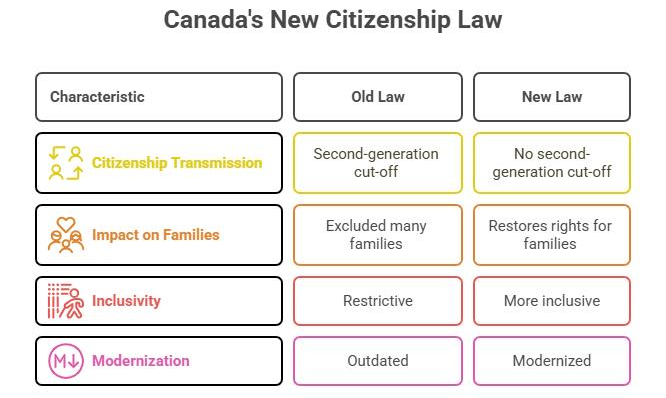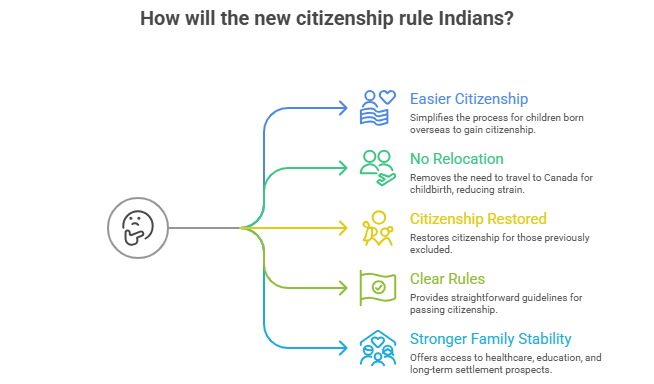Posted on November 24 2025
Good News for Indians Abroad: Canada Plans to Relax Citizenship Rules for Children
By , Editor
Updated February 16 2026
Highlights: Canada Set to Change Citizenship Rules, Allowing More Foreign-Born Children to Qualify
- Canada is preparing a major change to its citizenship laws, offering relief to thousands of Indian-origin families with children born abroad.
- Bill C-3 has received royal assent, moving Canada closer to implementing the updated citizenship rules.
- The reform removes the 2009 “second-generation cut-off” rule, expanding eligibility for overseas-born children.
- Citizenship will be restored to individuals previously excluded under the old law, often referred to as “lost Canadians.”
- A new “substantial connection test” will require 1,095 days of Canadian presence; implementation is expected by January 2026.
*Want to migrate to Canada? Sign up with Y-Axis for end-to-end assistance with the process.
Canada’s New Citizenship Law to Restore Rights for Overseas-Born Children of Indian Families
Canada is preparing to introduce a landmark change to its citizenship laws, offering long-awaited relief to thousands of Indian-origin families. The government has moved a step closer to ending the restrictive “second-generation cut-off” rule, a policy that prevented many Canadian citizens born abroad from passing on citizenship to their children who were also born overseas.
With Bill C-3 receiving royal assent, Canada is now on the path to implementing one of its most significant citizenship reforms in more than a decade. Once the federal government finalizes the implementation date, the new law will officially come into effect, opening the door for overseas-born children of Canadian citizens, including many Indian families to secure citizenship through a fairer and more inclusive process.
This historic change not only restores rights for families previously excluded but also modernizes Canada’s citizenship framework to reflect how globally mobile families live today.

Also, read…
New Canada Citizenship Bill: A Game-Changer for Indians Living Overseas
Why This Change Matters for Indian-Origin Families Worldwide
For more than a decade, Canada’s “second-generation cut-off” rule has caused challenges for thousands of families, especially Indian-origin professionals working internationally.
What was the second-generation cut-off?
Introduced in 2009, the rule prevented Canadian citizens who were born abroad from automatically passing citizenship to their children if the children were also born outside Canada. This created a group known as “lost Canadians”, who believed they should be recognized as citizens but were legally excluded.
This resulted in difficult situations where many families had to:
- Relocate to Canada solely to give birth
- Navigate complex immigration pathways for their own children
- Face stress, uncertainty, and long legal battles
In December 2023, the Ontario Superior Court ruled this restriction unconstitutional. The federal government accepted the ruling and chose not to appeal, paving the way for legislative reform.
What the New ‘Substantial Connection Test’ Means for Parents Born Abroad
As Canada prepares to remove the second-generation cut-off entirely, the government has introduced a new safeguard to ensure that citizenship remains meaningful and tied to a genuine relationship with the country. This safeguard is known as the “substantial connection test.”
Under this new requirement, a Canadian citizen who was born outside Canada will be able to pass citizenship to their child born abroad if they can show:
At least 1,095 cumulative days (3 years) of physical presence in Canada before their child’s birth or adoption.
This standard mirrors citizenship practices in countries like the United States, United Kingdom, and Australia, and provides a clear, fair, and modern framework. Importantly, the rule is flexible, parents do not need to show consecutive years of presence, only a total of 1,095 days.
For Indian-origin families, especially those working across multiple countries, this test creates a predictable pathway. Parents who have studied, worked, or lived in Canada previously will now have a straightforward way to secure citizenship for their children born overseas.
The substantial connection test also ensures that Canadian citizenship remains connected to real ties, whether through education, employment, or residence, while still supporting families with international lifestyles.
Immigration experts predict that once implemented, this rule will simplify cases that previously led to confusion, long application delays, and legal hurdles for Indian families living abroad.
Also, read…
Breaking News! Canada targets 2 million TRs and PRs under 2026–2028 Immigration Levels Plan!
How the New Citizenship Rule Will Benefit Indian-Origin Families
The upcoming changes to Canada’s citizenship law are expected to bring major relief to thousands of Indian-origin families living across the world. For years, many global Indian professionals faced challenges passing citizenship to their children born abroad. With Bill C-3 set to remove the second-generation cut-off, the process will become far simpler, faster, and more inclusive.
- Easier citizenship for children born overseas: Indian-origin Canadians working in countries like the UAE, US, UK, or Singapore will now have a clearer and simpler path to secure citizenship for children born outside Canada.
- No need to relocate to Canada for childbirth: Families previously felt compelled to travel to Canada to ensure their child qualified for citizenship. The new rule removes this pressure and reduces financial and emotional strain.
- Citizenship restored for excluded families: Children who were denied citizenship because of the old second-generation cut-off—often known as lost Canadians—will finally get their status back.
- Clear rules for the future: With the new 1,095-day presence requirement, Indian-origin parents born abroad have a straightforward and predictable guideline for passing citizenship to their children.
- Stronger family stability and future opportunities: Children gaining Canadian citizenship will have access to Canada’s world-class healthcare, education, and long-term settlement prospects, giving Indian families greater security and planning power.

*Are you looking for step-by-step assistance with Canadian immigration? Contact Y-Axis, the world’s No. 1 overseas immigration consultancy!
For recent Canadian immigration updates, check out Y-Axis Canada immigration News!
FAQs
What changes is Canada proposing to its citizenship laws for overseas-born children?
Canada is proposing amendments that would allow Canadian citizens born abroad to pass citizenship to their overseas-born children beyond the first generation. The reform removes the long-standing “first-generation limit,” which previously prevented many children of Canadians from becoming citizens by descent. A new “substantial connection” requirement will apply, meaning the Canadian parent must have lived in Canada for at least 1,095 days before the child’s birth or adoption. The proposal also includes restoring citizenship to individuals who lost or did not receive citizenship due to outdated provisions, offering more inclusive pathways for affected families.
Who will benefit from the proposed amendments to Canada’s citizenship rules?
These changes primarily benefit children born outside Canada to Canadian parents who were also born abroad, a group previously excluded under the first-generation limit. Families in the global diaspora, including professionals, students, and long-term residents abroad, will gain the ability to transmit citizenship more easily. The amendments will also support adopted children born overseas if their Canadian parent meets the physical-presence requirement. In addition, individuals known as “Lost Canadians,” who lost or never acquired citizenship because of older legal provisions, may have their status restored. Overall, the reform creates a more equitable framework for globally mobile families.
What is the ‘second-generation born abroad’ rule and how is Canada planning to change it?
The second-generation born abroad rule limited automatic citizenship by descent to only the first generation born outside Canada. If a Canadian citizen was born abroad, their children born overseas were not eligible for citizenship. The proposed changes remove this restriction, allowing Canadian citizens born abroad to pass citizenship to their children, provided they meet the substantial-connection requirement of three years of physical presence in Canada. This change aims to modernise the Citizenship Act and address long-standing inequities faced by Canadian families living abroad, ensuring that citizenship can be transmitted more fairly across generations.
Will Canadian citizens living abroad be able to pass citizenship to their children under the new proposal?
Yes. Under the proposed amendments, Canadian citizens living abroad will have the ability to pass citizenship to their children born outside Canada, even if the parent was also born overseas. The key condition is that the parent must demonstrate at least 1,095 days of physical presence in Canada before the child’s birth or adoption. This requirement ensures a meaningful connection to Canada while offering greater flexibility for internationally mobile Canadians. Once implemented, the new rules will provide broader and clearer pathways for families raising children abroad to secure Canadian citizenship for the next generation.
What prompted the Canadian government to review and update its citizenship legislation?
The review was prompted by a court decision that found parts of the first-generation limit unconstitutional. The ruling highlighted how the existing law created significant inequities for children of Canadians born abroad. This triggered a commitment by the federal government to modernise the Citizenship Act and address gaps affecting globally mobile families. Changing family structures, increasing international mobility, and long-standing concerns about “Lost Canadians” also contributed to the push for reform. The updated legislation aims to ensure fairness, protect family unity, and reflect modern realities of Canadian citizens living and working around the world.
Are the proposed citizenship law changes already in effect or still under consideration?
The changes are still under consideration and have not yet come into force. The proposed amendments are progressing through the legislative process, which includes parliamentary reviews, debates, and final approval steps. After both Houses of Parliament pass the bill, it must receive Royal Assent, and the government must formally set an implementation date. Until then, the current rules continue to apply, though some interim measures may be available for affected individuals. The reform is moving forward, but Canadians abroad should wait for official confirmation before the new pathways to citizenship become active.
How will the new rules impact families with children born outside Canada who were previously ineligible for citizenship?
The reforms will significantly expand eligibility for children born abroad who were previously excluded under the first-generation limit. Families where the Canadian parent was also born overseas will now have a pathway to secure citizenship for their children, provided the parent meets the required physical-presence threshold. This change will reduce uncertainty and help families maintain stronger ties to Canada across generations. The reforms also include provisions to restore citizenship for individuals affected by older laws, ensuring more fairness for those who lost or never acquired citizenship due to technical restrictions or outdated legislation.
Will the updated citizenship rules apply retroactively to children already born abroad?
Yes, the proposed changes are intended to apply retroactively to individuals who would have been eligible for citizenship if the first-generation limit had not existed. This means that many children and adults born abroad may have their citizenship recognized or restored once the law takes effect. Retroactive application will depend on the final legislative wording and the implementation provisions set by the government. The goal is to correct past inequities and ensure that families unfairly affected by older rules have access to the citizenship they would have otherwise received.
What steps must the Canadian government complete before the new citizenship amendments become law?
For the amendments to take effect, the government must first pass the bill through all stages in both the House of Commons and the Senate. After parliamentary approval, the bill must receive Royal Assent. The government will then need to announce an official date when the amendments come into force, allowing time for administrative systems and application processes to be updated. Only after these steps are completed will the new rules become legally binding. Until then, the existing citizenship rules remain unchanged.
How will these changes make it easier for overseas-born children to obtain Canadian citizenship?
The reforms will make it easier by eliminating the generational restriction that previously prevented many Canadian parents from passing citizenship to their overseas-born children. The new framework focuses instead on the parent’s connection to Canada, making eligibility clearer and more inclusive. Children who were previously ineligible can now qualify if their Canadian parent has sufficient physical-presence history. The legislation also restores citizenship for those unfairly affected by past rules. Overall, the changes modernise the system, promote fairness, and help globally mobile Canadian families secure citizenship for their children with fewer barriers.
Tags:
Canada immigration
Migrate to Canada
Canada visas
Canada citizenship
Canadian citizenship
Citizenship rules for children
New Canadian citizenship rules
citizenship by descent
Canada Citizenship Laws
Bill C-3
Canada immigration news
Share
Options for you by Y-Axis
Get it on your mobile
Get News alerts
Contact Y-Axis

